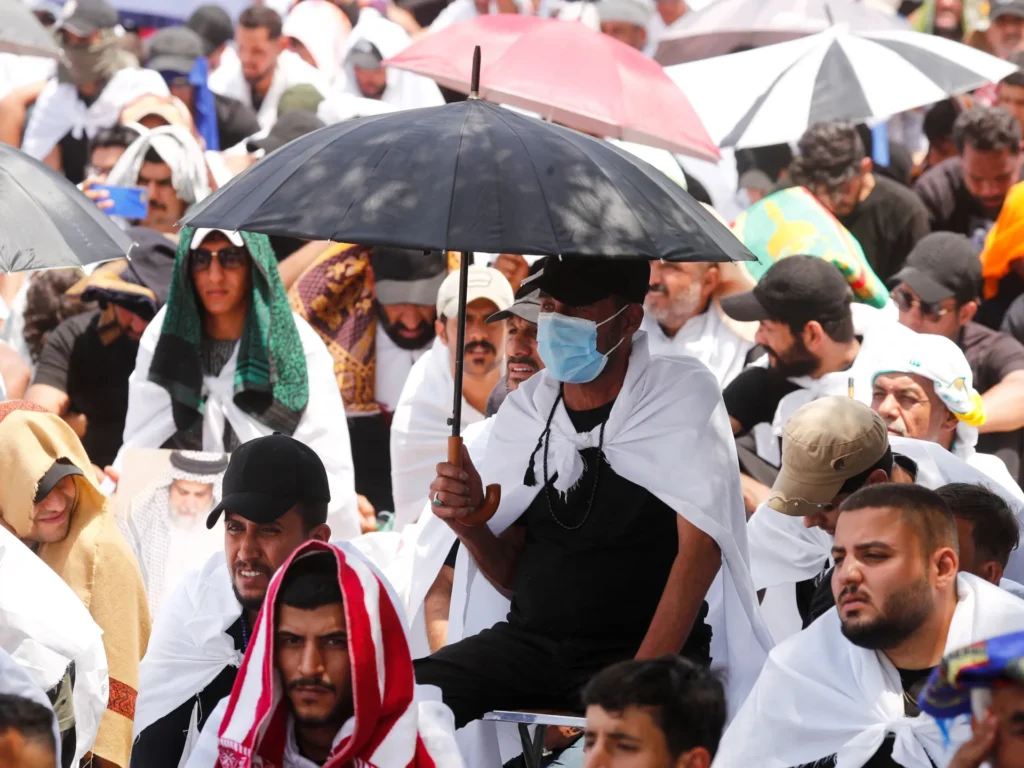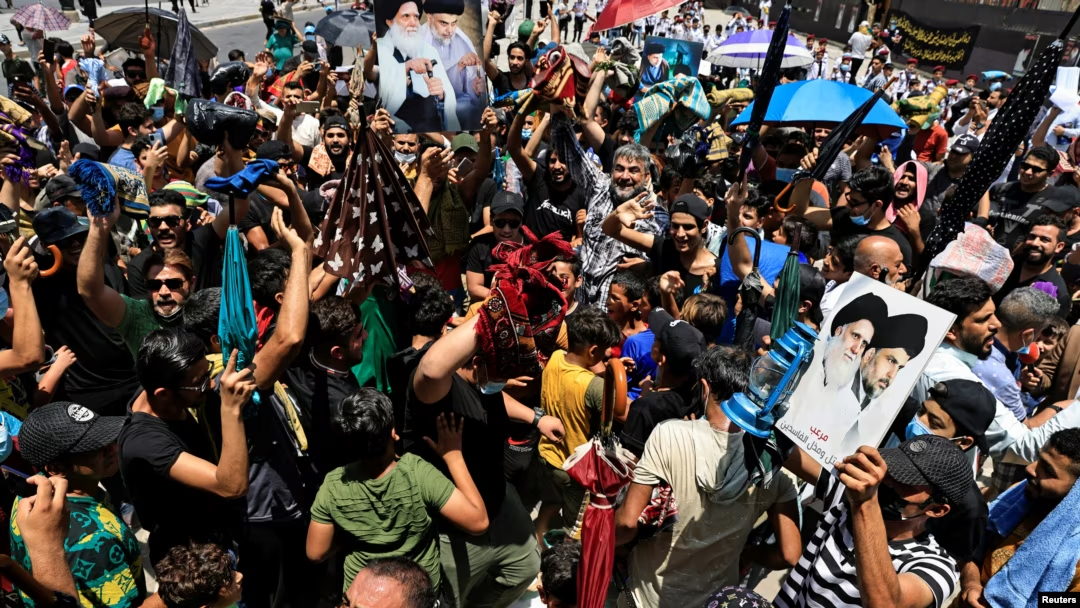Iraq is grappling with an escalating climate emergency as extreme Unprecedented Heatwaves, power outages, and public unrest converge, straining the nation’s infrastructure and challenging the resilience of its citizens.
Unrelenting Heatwaves and Health Impacts
In April 2025, Iraq experienced one of its most intense sandstorms of the year, reducing visibility to under half a mile and blanketing cities in a thick layer of dust. This sandstorm, which originated from the neighboring deserts of Saudi Arabia, swept through Iraq and neighboring Kuwait, disrupting daily life and affecting air quality. Many cities, particularly in southern Iraq, reported increased cases of respiratory issues and asthma exacerbations, with hospitals overwhelmed by patients seeking relief.
Along with the sandstorm, Iraq has been facing a period of unrelenting heat. Temperatures have consistently soared above 50°C (122°F) in several provinces, including Baghdad. This heatwave has triggered a health crisis, with hospitals seeing a dramatic increase in cases of heatstroke, dehydration, and other heat-related illnesses. Doctors and healthcare workers are struggling to keep up with the surge in patients, with many hospitals running out of cooling systems due to power cuts.

Educational institutions, too, have felt the brunt of the soaring temperatures. In many schools, students have fainted in classrooms because of the unbearable heat, prompting some authorities to close schools or delay exams. The excessive heat is not just a physical burden but an emotional and psychological one as well. People in affected areas are living in a constant state of discomfort, with no respite from the searing temperatures.
Power Outages and Public Protests
The extreme heat has placed immense strain on Iraq’s already fragile power grid. As temperatures have risen, the demand for electricity has surged, but power plants are ill-equipped to handle the pressure. Widespread power outages have become a daily occurrence, leaving residents in the dark during the hottest parts of the day and night. This lack of electricity has made life unbearable for many Iraqis, particularly in urban areas, where electricity is essential for running air conditioning units, refrigerators, and other essential appliances.
In southern Iraq, including the cities of Basra and Nasiriyah, the power outages have sparked angry protests. Residents have taken to the streets, blocking roads and burning tires in frustration over the government’s inability to provide consistent electricity. Protesters are demanding urgent action to address the energy crisis and improve living conditions.
The government’s response has been to try and increase power production by sourcing additional fuel and boosting imports from neighboring countries. However, these measures have yet to alleviate the situation. In Basra, power outages have also led to severe water shortages, leaving residents without clean water for drinking or sanitation. The frustration of not having access to basic resources has only fueled public discontent.
The protests have occasionally turned violent, with security forces clashing with demonstrators. This growing unrest signals deeper issues within the government’s management of the country’s resources and its ability to protect the welfare of its citizens. The rising anger from the population shows that Iraq’s ongoing struggles are not only about the weather but also about the state’s failure to address basic infrastructure and services.
Social Strains and Public Sentiment
The combination of extreme weather and power outages is placing immense stress on Iraqi society. Hospitals are overwhelmed, and residents are struggling to cope with daily challenges. In some areas, like Amarah, the local hospitals are overcrowded, and the medical staff is stretched thin, doing their best to provide care under difficult conditions.
Furthermore, the social strain is exacerbated by rising temperatures. Experts have reported an increase in cases of domestic violence, as high temperatures often lead to heightened stress and aggression. Families in heat-stressed conditions are finding it difficult to maintain stability, and incidents of violence are on the rise in some regions.
The growing frustration and stress have also led to a sense of hopelessness among many Iraqis, particularly the younger generation. As opportunities for employment remain scarce and the quality of life continues to deteriorate, many are questioning the government’s commitment to addressing these ongoing crises. The sense of abandonment by the state is palpable, and some citizens are turning to social media platforms to voice their anger and demand action.
Government Response and Challenges
The Iraqi government, under Prime Minister Mustafa al-Kadhimi, has acknowledged the severity of the crisis. In response to the widespread power outages, the government has formed a special crisis cell to oversee energy restoration efforts. The government has also called for additional funding to address the electricity shortages and has pushed for more cooperation with neighboring countries to secure energy imports.
However, the response from the government has been slow and often ineffective, hindered by several challenges, including corruption and political instability. The resignation of the Electricity Minister in mid-2024 only highlights the challenges in managing the country’s energy sector. Despite these efforts, many Iraqis remain unconvinced, as the government has failed to deliver tangible results for years.
The government’s failure to ensure basic services like reliable electricity, clean water, and medical care during these extreme conditions has led many Iraqis to question the legitimacy of their leaders. Some argue that Iraq is not prepared for the long-term impacts of climate change, which will likely continue to worsen. This frustration has been compounded by the ongoing political gridlock in the country, which hinders any meaningful reforms or effective responses to the crisis.
Looking Ahead: Climate Change and Future Risks
Iraq is one of the countries most vulnerable to the effects of climate change, facing extreme heat, reduced rainfall, and worsening desertification. This year’s crisis is a stark reminder of the growing threats posed by a warming planet. As climate change intensifies, Iraq is expected to experience more frequent and severe heatwaves, droughts, and sandstorms, putting further pressure on its already overstretched infrastructure.
Experts argue that Iraq needs to adopt comprehensive climate adaptation strategies to address the growing environmental challenges. This includes investing in water conservation, renewable energy, and disaster preparedness measures. Without significant investments in infrastructure and climate resilience, Iraq will continue to face similar crises in the years to come.
The international community has also called for increased support to help Iraq address its climate vulnerabilities. Climate finance and technical assistance could help Iraq build the necessary infrastructure to deal with extreme weather events. However, political and financial barriers remain significant, and without political will at the national level, these efforts may not be enough to mitigate the risks.
Conclusion
Iraq’s ongoing battle with extreme weather, power outages, and social unrest highlights the deepening crisis caused by climate change and poor governance. As Iraq faces one of its most difficult challenges in recent history, it is essential for the government to take immediate action to address the energy crisis and ensure that citizens’ basic needs are met. While Iraqis are showing immense resilience in the face of adversity, the government’s response will ultimately determine the nation’s ability to weather future climate-related disasters.
iQ Cars Raises 7-Figure Seed Round to Modernize Iraq’s Auto Market



